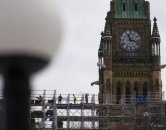Pierre Poilievre’s Hardest Test Yet: His Own Party

Conservative leader Pierre Poilievre will return to the House of Commons this fall after securing a seat in rural Alberta over the summer. Poilievre handily won the August 18 Battle River—Crowfoot by-election with a little over 80 percent of the vote, in line with past Conservative performances in the riding.
The by-election, however, was only the first—and easiest—step on Poilievre’s long road to political recovery. Pre-election polls last winter showed that while he remained a polarizing figure in Canadian politics, he nevertheless enjoyed overwhelming backing from Conservative voters. But after losing the 2025 general election to Mark Carney’s Liberals—along with his own long-held seat in Carleton—Poilievre may now face his harshest critics from his own side of the aisle, and from what once seemed like an unshakable base.
According to the Conservative Party constitution, a leader defeated in a general election must submit to a vote of confidence from party members in order to stay on. That vote will take place at the next Conservative national convention in January 2026, in Calgary.
What do the numbers say about Poilievre’s standing? The Angus Reid Institute (ARI) recently released post-election polling on how Canadians—and, more interestingly, Conservative voters—viewed Poilievre’s campaign and leadership prospects.
One of the themes Carney’s Liberals surfed on during the campaign was the threat posed to Canada’s economy and sovereignty coming from south of the border, and more specifically from U.S. President Donald Trump. Many Liberals argued that a politician running a mostly negative campaign and who “sounds like Donald Trump” couldn’t defend Canada’s interests in this conflict.
According to ARI’s numbers, this Trump-Poilievre comparison had a lot of voters nodding, including a non-negligible fraction of Conservatives supporters. Data from the survey shows 59 percent of respondents agreed to the statement “Pierre Poilievre sounded too much like Donald Trump” during the 2025 campaign, against 35 percent who disagreed.
!function(){"use strict";window.addEventListener("message",function(a){if(void 0!==a.data["datawrapper-height"]){var e=document.querySelectorAll("iframe");for(var t in a.data["datawrapper-height"])for(var r,i=0;r=e[i];i++)if(r.contentWindow===a.source){var d=a.data["datawrapper-height"][t]+"px";r.style.height=d}}})}();
Yet, it’s only when we break down the results by region and demographics that we see how much this argument had traction with voters.
Regionally, majorities agreed that Poilievre sounded too much like Trump in Quebec (64 percent), Atlantic Canada (63 percent), Ontario (60 percent), and British Columbia (58 percent). Even in the Conservative strongholds of Alberta and Saskatchewan, as many respondents agreed than disagreed.
Among both men (55 percent) and women (64 percent) and across all voting age groups, most voters believe Poilievre sounded too much like the U.S. president. This is an impression that is hard to shake off once it takes hold.
While we expect voters from non-Conservative parties to agree to the Poilievre-Trump links, ARI also found that the comparisons found echoes even among a non-negligeable fraction of Conservative voters: 19 percent of CPC voters thought Poilievre sounded too much like Trump—a minority for sure, but which still represents one in five Conservatives. Hardly negligible.
!function(){"use strict";window.addEventListener("message",function(a){if(void 0!==a.data["datawrapper-height"]){var e=document.querySelectorAll("iframe");for(var t in a.data["datawrapper-height"])for(var r,i=0;r=e[i];i++)if(r.contentWindow===a.source){var d=a.data["datawrapper-height"][t]+"px";r.style.height=d}}})}();
Other numbers point to further dissatisfaction within the base: 29 percent of Conservatives agreed to the statement “The campaign slogan ‘Bring it Home’ didn’t make any sense”, and 27 percent of Conservatives believe the Poilievre campaign was too negative. Small cracks in the foundation those may be, but they suggest a notable fraction of CPC voters have legitimate criticism of their leader (and the campaign he led), and those could very well resurface next winter in Calgary.
ARI concluded its survey with a blunt question: Should Poilievre remain leader or be replaced?
Here was the wording of the question: “The Conservative Party of Canada is set to hold a national convention in January 2026, which will include a vote on the future of leader Piere Poilievre. If it were up to you, do you believe Poilievre should… 1) Lead the party into the next election, or 2) Be voted out, a new leader should be elected.”
Among all respondents, 64 percent believe Poilievre should remain the CPC leader going forward and into the next campaign, against 22 percent who agreed that Poilievre should be voted out by the membership (or otherwise). That is a nearly 3-to-1 ratio in favour of Poilievre staying put, which looks favourable at first glance for the Conservative leader.
When we look under the hood, ARI measured that majorities in all provinces (yes, even Quebec), across all age groups, and among both men and women want Poilievre to stay on. Which, for a leader whose personal favourability numbers are lukewarm at best, may appear contradictory.
The post Pierre Poilievre’s Hardest Test Yet: His Own Party first appeared on The Walrus.

Comments
Be the first to comment